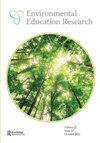Fostering students’ systems thinking competence for sustainability by using multiple real-world learning approaches
IF 3.1
3区 教育学
Q1 EDUCATION & EDUCATIONAL RESEARCH
引用次数: 2
Abstract
Abstract For a sustainable future, equipping sustainability change agents with relevant sustainability competencies is crucial. Among these competencies is system thinking competence – the understanding of complex interrelationships among the dimensions of sustainable development and the impacts of the interrelationships. Learning approaches relevant to fostering sustainability competencies have been studied. However, research is rare on fostering systems thinking competence by simultaneously using multiple, real-world, and innovative learning approaches. To address this gap, we conducted a pre-test–post-test exploratory experimental study involving higher education students (n = 36). The study explored the contributions of field trips and collaborative learning in combination with mobile learning and paper-and-pencil note taking. The study simultaneously implemented a combined set of learning approaches in a real-world environment. The results suggest that the learning approaches and the real-world environment contribute to fostering the systems thinking competence of participants by exposing them to complex real-world systems and enabling the exchanging of diverse ideas among collaborating participants. As such, our study contributes to social constructivist learning discourses in education for sustainable development by indicating specific combinations of learning approaches and environments that facilitate the meaningful engagement and motivation of learners through self-regulated learning.运用多种现实世界的学习方法,培养学生的系统思考能力
为了实现可持续发展的未来,为可持续发展变革主体配备相关的可持续发展能力至关重要。在这些能力中包括系统思维能力——理解可持续发展各方面之间复杂的相互关系以及相互关系的影响。研究了与培养可持续能力有关的学习方法。然而,通过同时使用多种、真实的、创新的学习方法来培养系统思维能力的研究很少。为了解决这一差距,我们进行了一项涉及高等教育学生的前测后测探索性实验研究(n = 36)。该研究探讨了实地考察和协作学习结合移动学习和纸笔笔记的贡献。该研究同时在现实环境中实施了一套组合的学习方法。研究结果表明,学习方法和现实世界环境有助于培养参与者的系统思维能力,使他们接触复杂的现实世界系统,并使合作参与者之间能够交流不同的想法。因此,我们的研究通过指出学习方法和环境的具体组合,促进学习者通过自我调节学习的有意义的参与和动机,为可持续发展教育中的社会建构主义学习话语做出了贡献。
本文章由计算机程序翻译,如有差异,请以英文原文为准。
求助全文
约1分钟内获得全文
求助全文

 求助内容:
求助内容: 应助结果提醒方式:
应助结果提醒方式:


